As office workers return, a Grand Rapids dry cleaner scrimps to hang on
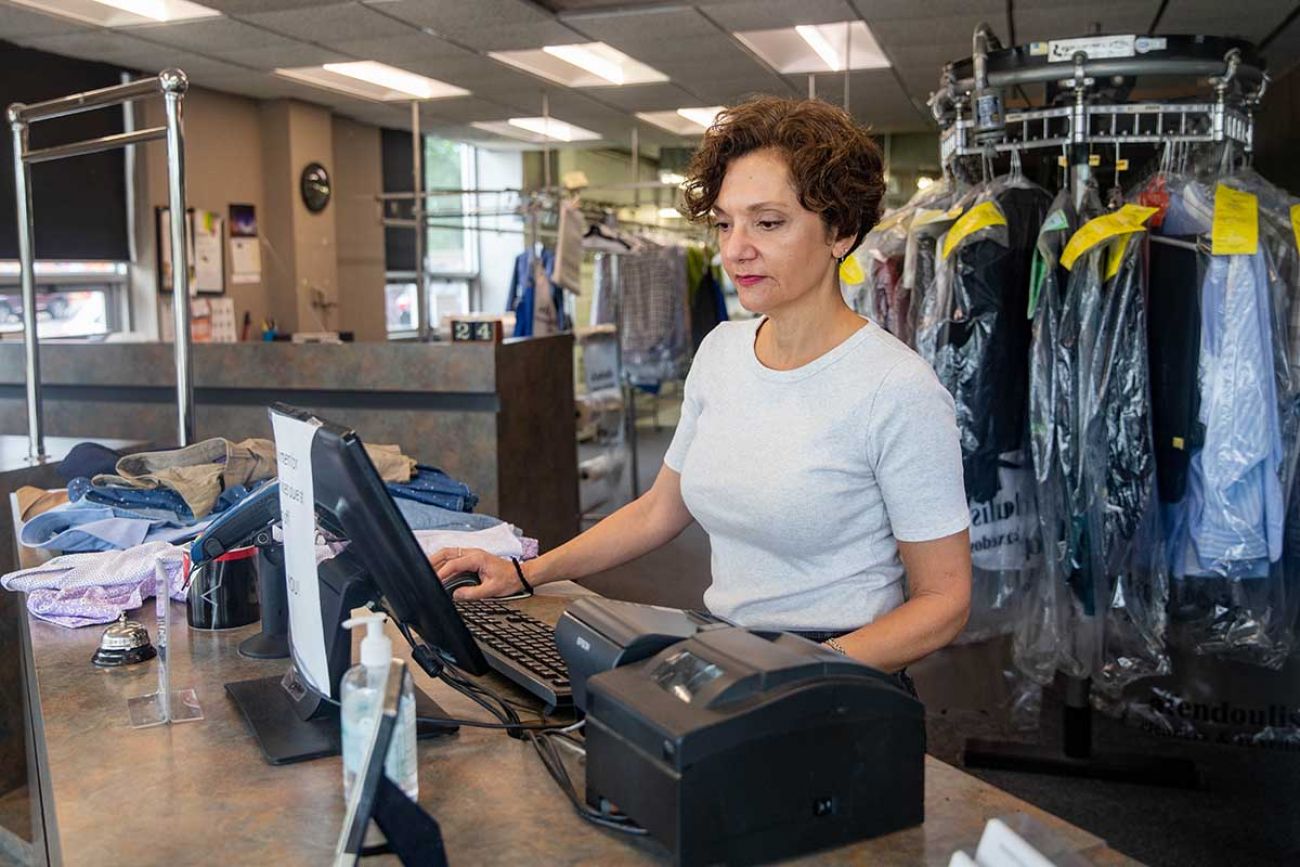
GRAND RAPIDS—Up to 700 men’s dress shirts per day used to be cleaned, pressed and put on a hanger for $3.25 each at Afendoulis Cleaners & Tuxedos.
The volume of office apparel signaled the importance of business customers at the 70-year-plus dry cleaners, located on a corner of Michigan Avenue a few blocks east of the growing “Medical Mile” in Grand Rapids and the city’s downtown office district.
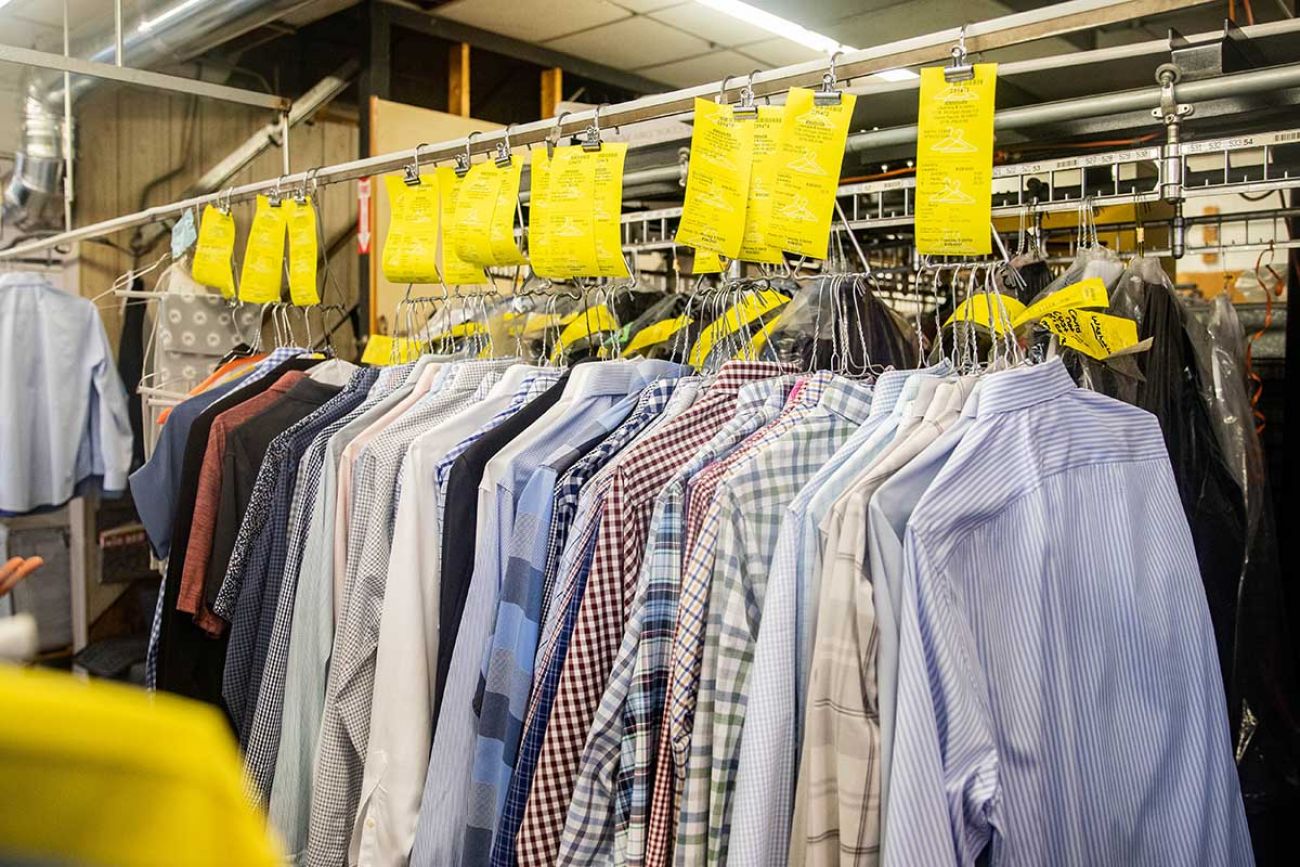
“We do more dress shirts than anything else,” co-owner Becky Afendoulis Trierweiler said, recalling the days before the pandemic and 15 months of health restrictions set by the state.
Related:
- A Michigan mall’s transformation: From Macy’s to self-storage
- Q&A: Michigan fitness club owner says how industry must change after COVID
- Michigan COVID restrictions ease as June 1 arrives
- Michigan to trim offices in Lansing, whose downtown struggles amid pandemic
- As Michigan reaches COVID vaccine mark, offices plan to welcome workers
But as office workers stayed home, so did their dress shirts — and most of their other clothing that once would have gone in for dry cleaning, which put Afendoulis, like many cleaners in the state, in a perilous situation.
“We depend on customers coming in the door,” Trierweiler said.
On May 24, Michigan lifted its restriction on in-person office work, and all capacity restrictions will end by July 1.
As a result, the coming weeks could be a lifeline for businesses that make their living by providing services for large group settings: table rentals for weddings; restaurant supplies for places that cater to conferences and celebrations, cleaning services for professional offices.
And for dry cleaners that depend on office attire — men’s and women’s shirts, pants, skirts and suits — for what Trierweiler called “my bread and butter.”
People returning to office work “means there's hope” for her business, she said.
Trierweiler runs the family business, which opened in 1949, like her late father did: Sam Afendoulis earned a reputation for his dry cleaners by remembering customers’ names and doing what it took to keep them coming back.

After losing 80 percent of sales at the worst point of the pandemic, Trierweiler is doing what she can to save on payroll expenses. Some days, she’s weeding outside a slower storefront on Cascade Road. Others, she’s working alongside pressers, who once worked full-time in the back shop.
On a recent Friday, she’s greeting people at the front counter. When one new customer says he can’t wait until Monday to pick up his work suit, she walks back to the production plant to see if the boiler is still on.
“I can steam it,” she said, returning to the counter and reaching over to take the garments. “You can pick this up tomorrow, or after 4 today.”
Trierweiler isn’t about to lose a chance to clean any fabric that comes through the door. Trickles of bedding, golf shirts and an occasional party dress helped keep the business alive since March 2020 while celebrations were limited and people worked from home, and cleaners across Michigan wondered whether coronavirus would crush them for good. According to industry estimates, up to 40 percent of dry cleaning stores may not survive the pandemic.
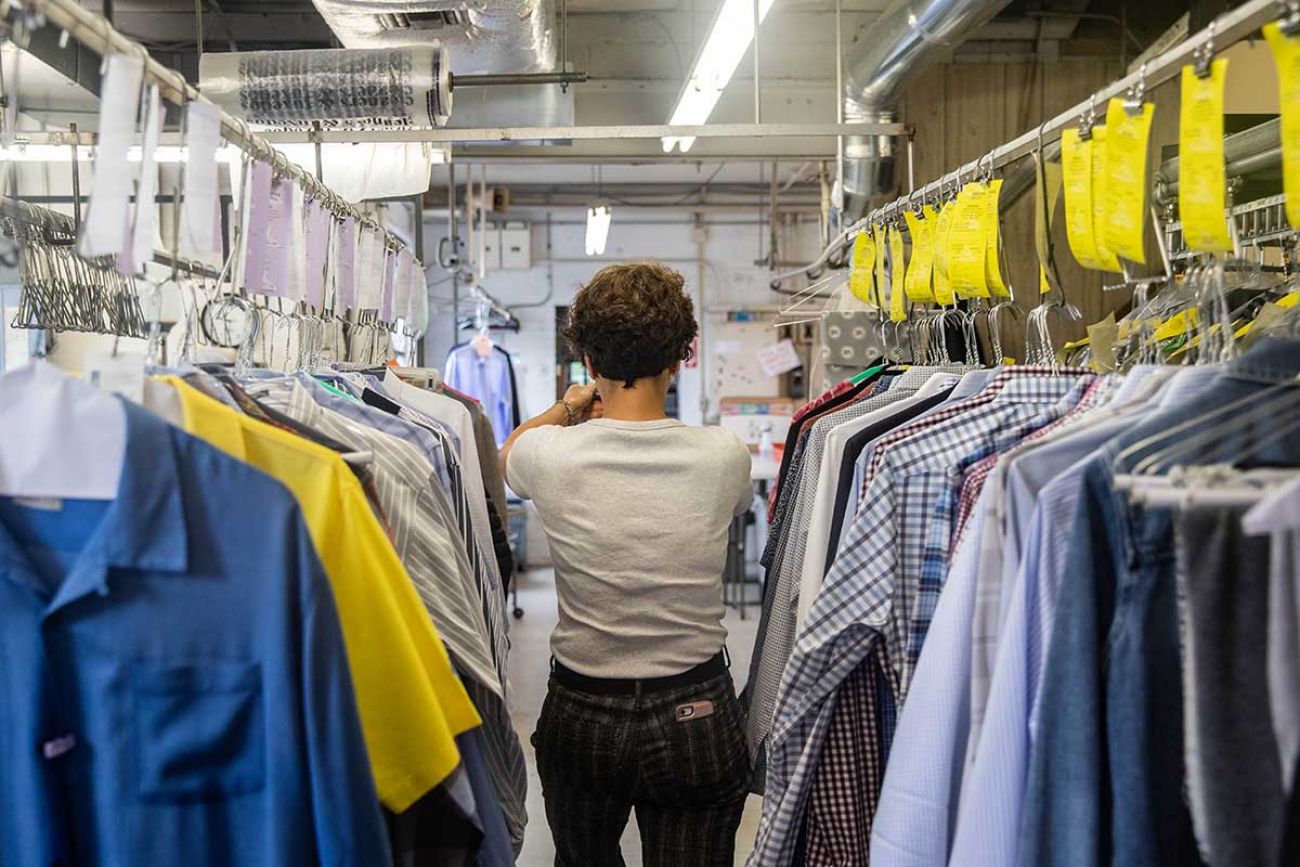
As businesses across the country make decisions about returning to in-person work, many recognize they may not need as much office space, signalling to landlords that vacancies could be pending. Others say that while productivity didn’t change, culture did, and they’re doubling down on returning to their offices. And hybrid work models — with workers coming into an office for a portion of their work week, and staying home for the remainder — may become common.
Caught amid those decisions are the cities and the businesses that count on the white-collar workers. In Detroit, Rocket Companies said it would start to bring its 19,000 workers back to downtown on Monday. State office workers can return to Lansing and other locations on July 12.
Returning office workers are “starting to become more noticeable... looking at traffic, parking lots and restaurants at lunch here in downtown Grand Rapids,” Andy Johnston, vice president for government affairs for the Grand Rapids Chamber of Commerce, said last week.
“I think in the first week of June, we’ll see an even more noticeable change.”
Trierweiler and other dry cleaning owners are counting on it. They want to become relevant again as people choose to trade their workday yoga pants and sweatshirts for clothes with waistbands and buttons.
“People still want to look nice in the office,” Trierweiler said.
‘Nobody was going into the office’
As the pandemic descended onto Michigan in March 2020, the change at Afendoulis Cleaners & Tuxedos was sudden and extreme.
“For the most part, everything that we got our money from in terms of dry cleaning had gone away,” Trierweiler said.
The business’ first hurdle was determining whether it was an essential business, according to state guidelines. The designation was critical to whether the business could call employees to work and impacted what kind of pandemic aid it might qualify for. The next step was to ensure work could be performed amid social distancing guidelines.
Both happened at Afendoulis, due in part to the work it performed for essential workers. Police officers and medical staff brought in uniforms and lab coats, and the spacious cleaning plant connected to the Michigan Avenue storefront offered workers plenty of space.
But that work wasn’t enough, at Afendoulis or at dry cleaners across the state.
“It’s clear what happened,” said Michelle Batora, executive director of the Michigan Institute of Laundering & Dry Cleaning, an industry group based in Okemos.
“Nobody was going into the office, so nobody was needing dry cleaning.”
Businesses with office workers figured out how to retain productivity remotely and work from home, said Rob Fowler, CEO of the Small Business Association of Michigan, “and their viability is not at stake.”
“But the fact that so many employees are working remotely is affecting other businesses,” he added, describing the unintended fallout from COVID-19 policy that created “this economic disaster.”
By the end of this year, 30 to 40 percent of U.S. dry cleaners could be permanently closed due to the disruption of the pandemic, Batora said. Dry cleaning business had been in decline since 2016 as casual workwear proliferated, but the industry lost $1.4 billion in revenue nationally from 2020 to 2021, falling to $7.8 billion, according to IBIS World data service.
Unclear, Batora said, is how Michigan fits into shutdown projections, since the state’s restrictions on in-person work and indoor events lasted longer than most.
That made it hard, Trierweiler said, because so many decisions were out of her control. The business did nothing wrong to deserve the revenue free-fall, leaving her feeling helpless.
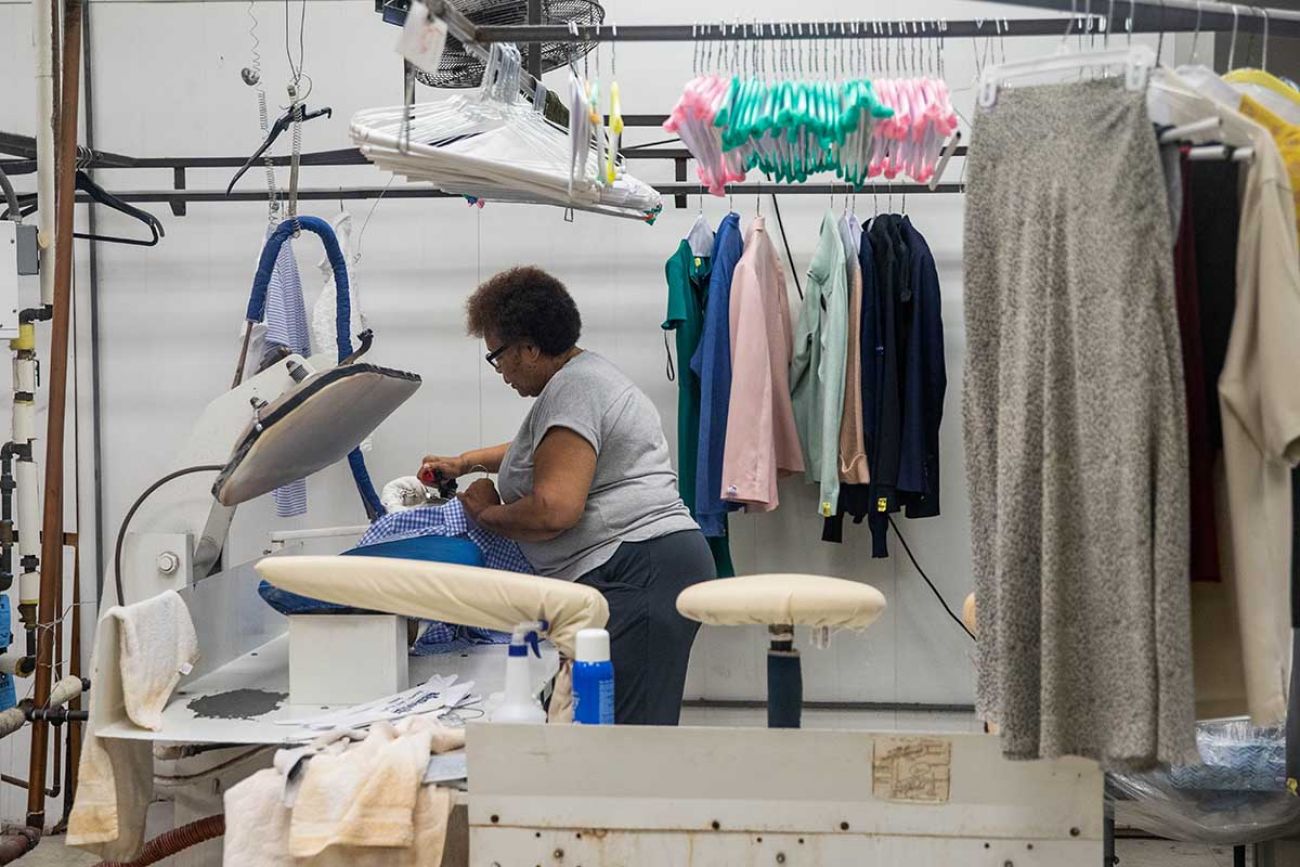
“We're so reputable. We worked so hard. Our name is on the building,” she said. “And this has been a labor of love for me.”
Trierweiler closed one of three storefronts, and turned to her brother, Chris Afendoulis, a certified public accountant for help with business survival loans as she and co-owner Stathi Afendoulis, another brother, made business decisions.
Most dry cleaners are small enterprises — largely single-site storefronts, maybe with another location or two, with some adding laundromat facilities or tailoring.
It’s an industry that remains largely untouched by consolidation and corporate growth. New entrepreneurs who want their own business can make that happen with dry cleaning, and recent immigrants still find opportunities in the field, Trierweiler said, much like her Greek family did decades ago.
But over the past year, the financial strain on the industry also provided a window into COVID’s impact on ordinary life. The rotating clothing racks carried fewer garments marking the best of times: weddings, proms and graduations; occasions that signal the life transitions people share with one another.
“Dry cleaners are a cornerstone of communities,” Batora said.
Getting back to normal
Afendoulis Cleaners & Tuxedos has survived for decades because of its customer service, Trierweiler said. But she’s not set in her ways and is willing to adapt to the marketplace.
Two business changes made years before the pandemic helped it survive: Contracting with a wholesale dry cleaning service about eight years ago, and adding tuxedo rentals to the storefront in the late 1950s. Even at the height of the pandemic, there were small weddings with a handful of men in tuxedos — maybe just for drive-by greetings — which brought in revenue to supplement routine dry cleaning orders.
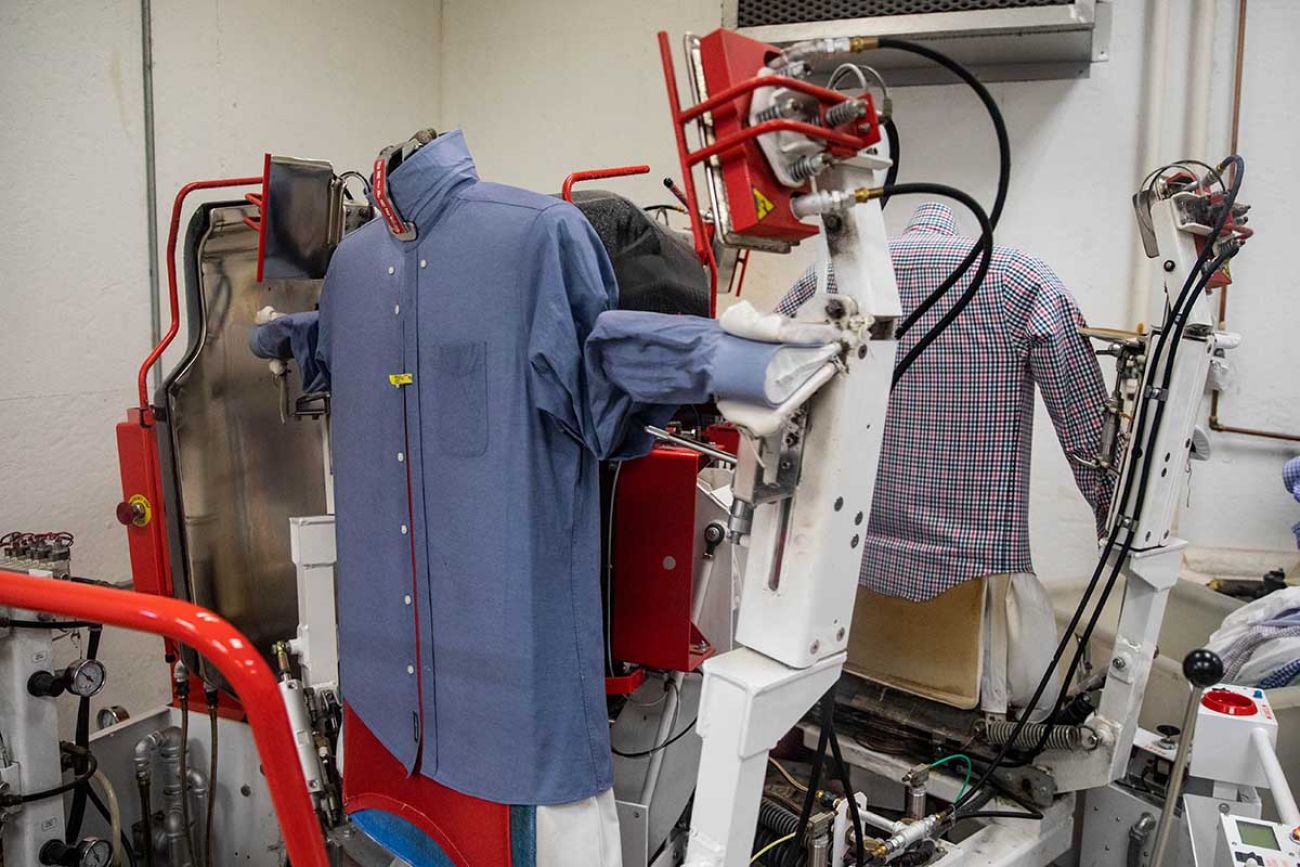
When Sam Afendoulis and his two brothers originally opened the store, laundry services were based on delivery. Now that storefront dry cleaners are a fixture in communities, his namesake business is looking at adding more delivery service.
Delivery services — for groceries, dinners and household essentials — took off during the pandemic. At Afendoulis, deliveries grew to 25 percent of its business.
“A lot of our members smartly turned to wash and fold as well,” Batora, of the industry group, said of laundry pick up and delivery services during the pandemic.
Trierweiler said she and her brother are considering that service, too.
Until then, Trierweiler is staying in touch with brides who have deferred ceremonies and making plans with them to outfit bridal parties.
And she’s hoping to bring back more employees, who before the pandemic may have worked full-time plus eight hours of overtime in a week. Today, they’re staffing the plant on two partial days with a handful of the 20-some people who used to work at Afendoulis.
But those work days are getting longer. Loyal customers who dug deep into storage closets to find something to bring in or who may have bought gift cards so that Afendoulis would have some cash revenue now are supplemented by new customers as restrictions ease and in-person work resumes.
Since March, more orders have been coming in. A look through the racks shows some women’s dresses, men’s casual shirts and winter wear that the owner probably hoped wouldn’t be needed again until late in the year.
And a few more men’s dress shirts.
Business Watch
Covering the intersection of business and policy, and informing Michigan employers and workers on the long road back from coronavirus.
- About Business Watch
- Subscribe
- Share tips and questions with Bridge Business Editor Paula Gardner
Thanks to our Business Watch sponsors.
Support Bridge's nonprofit civic journalism. Donate today.
See what new members are saying about why they donated to Bridge Michigan:
- “In order for this information to be accurate and unbiased it must be underwritten by its readers, not by special interests.” - Larry S.
- “Not many other media sources report on the topics Bridge does.” - Susan B.
- “Your journalism is outstanding and rare these days.” - Mark S.
If you want to ensure the future of nonpartisan, nonprofit Michigan journalism, please become a member today. You, too, will be asked why you donated and maybe we'll feature your quote next time!




